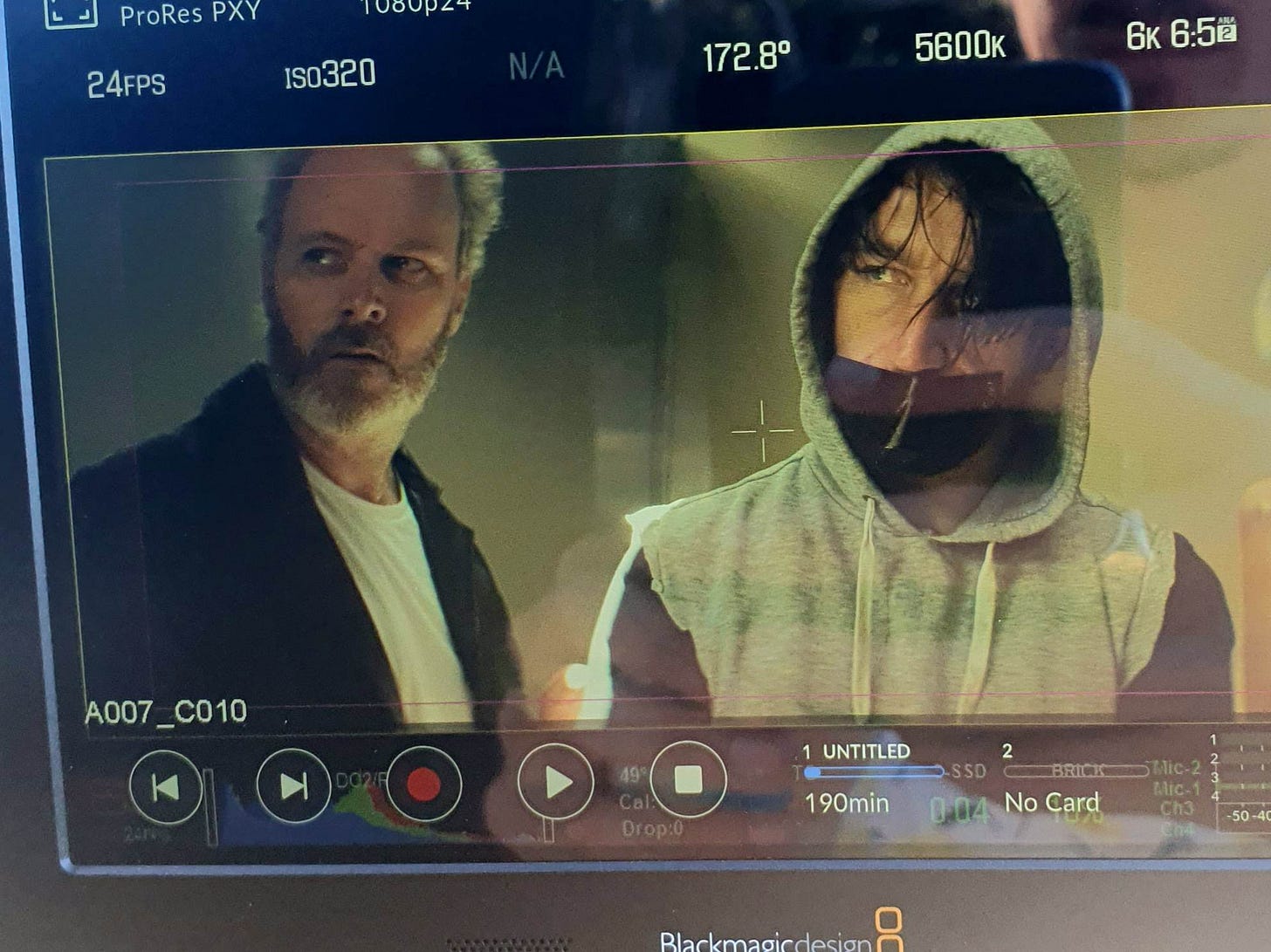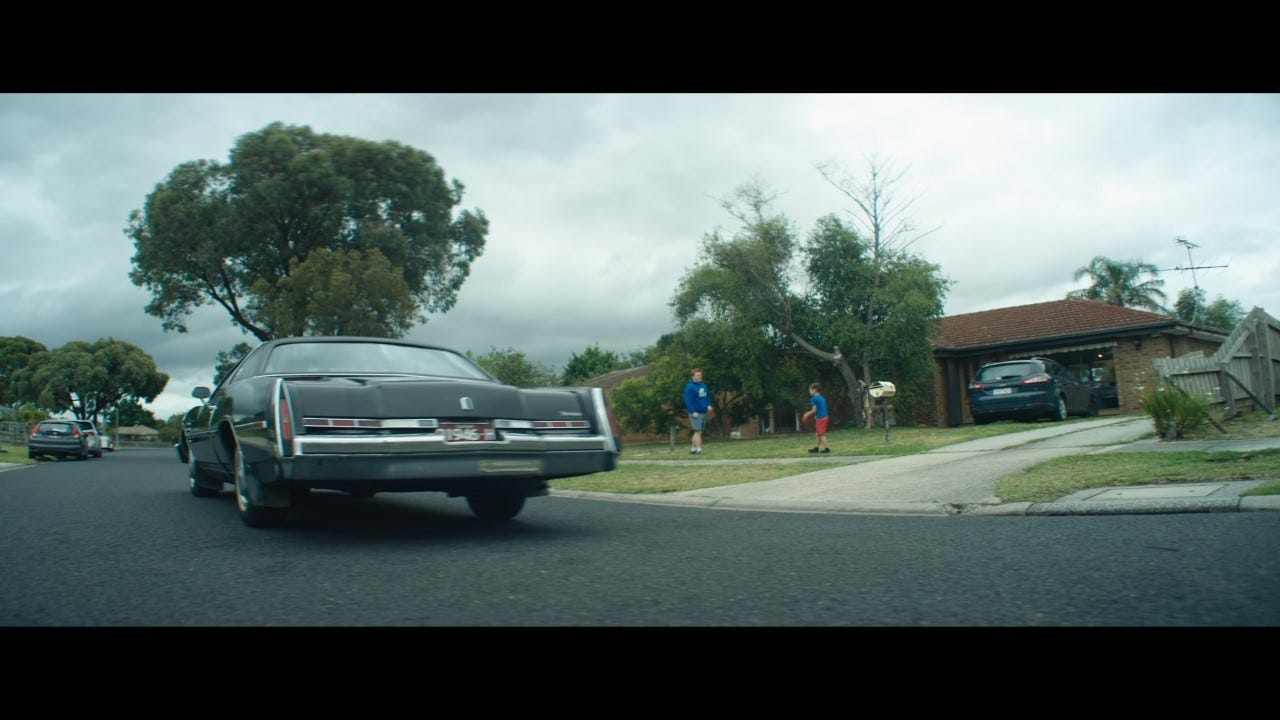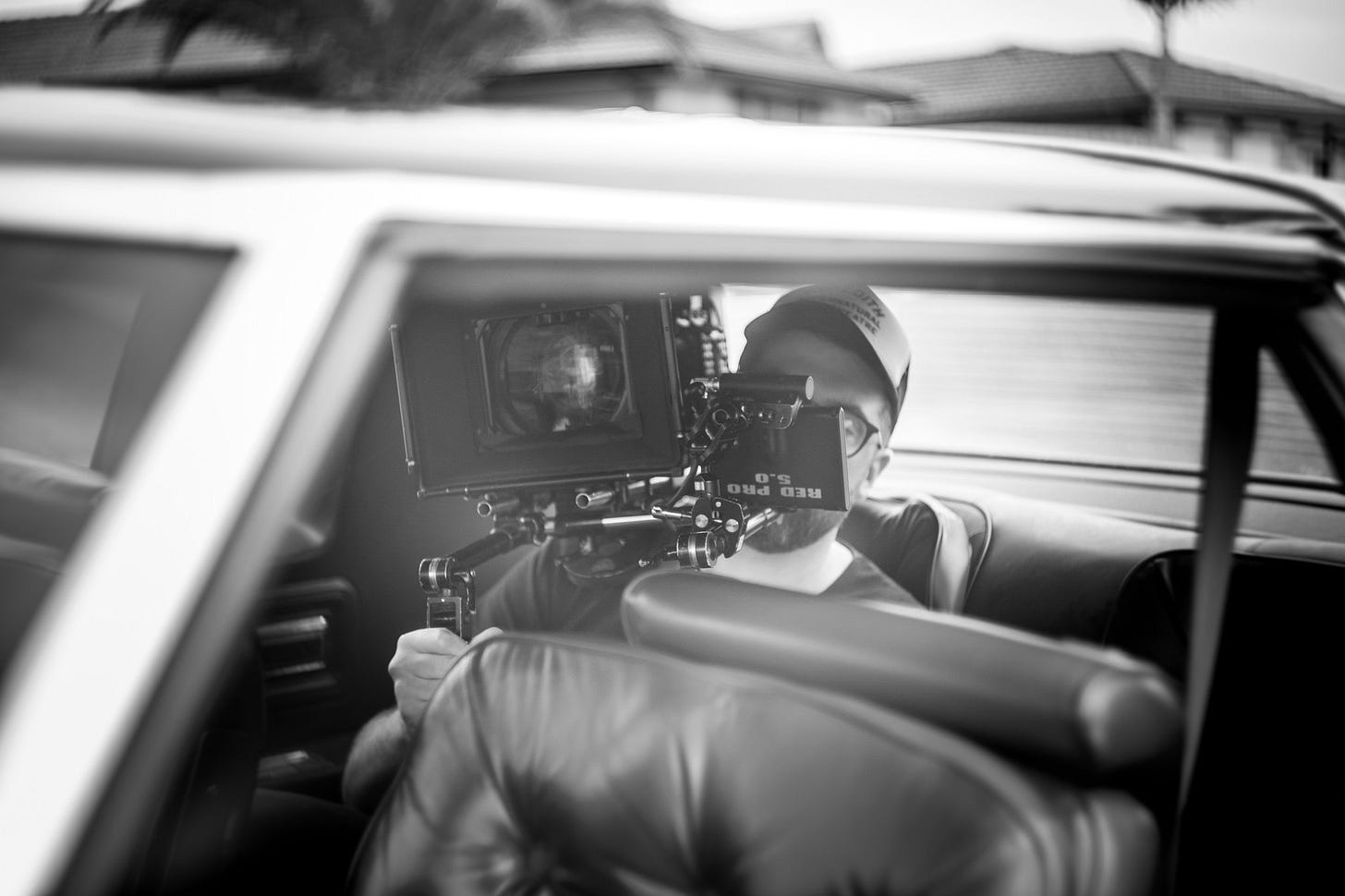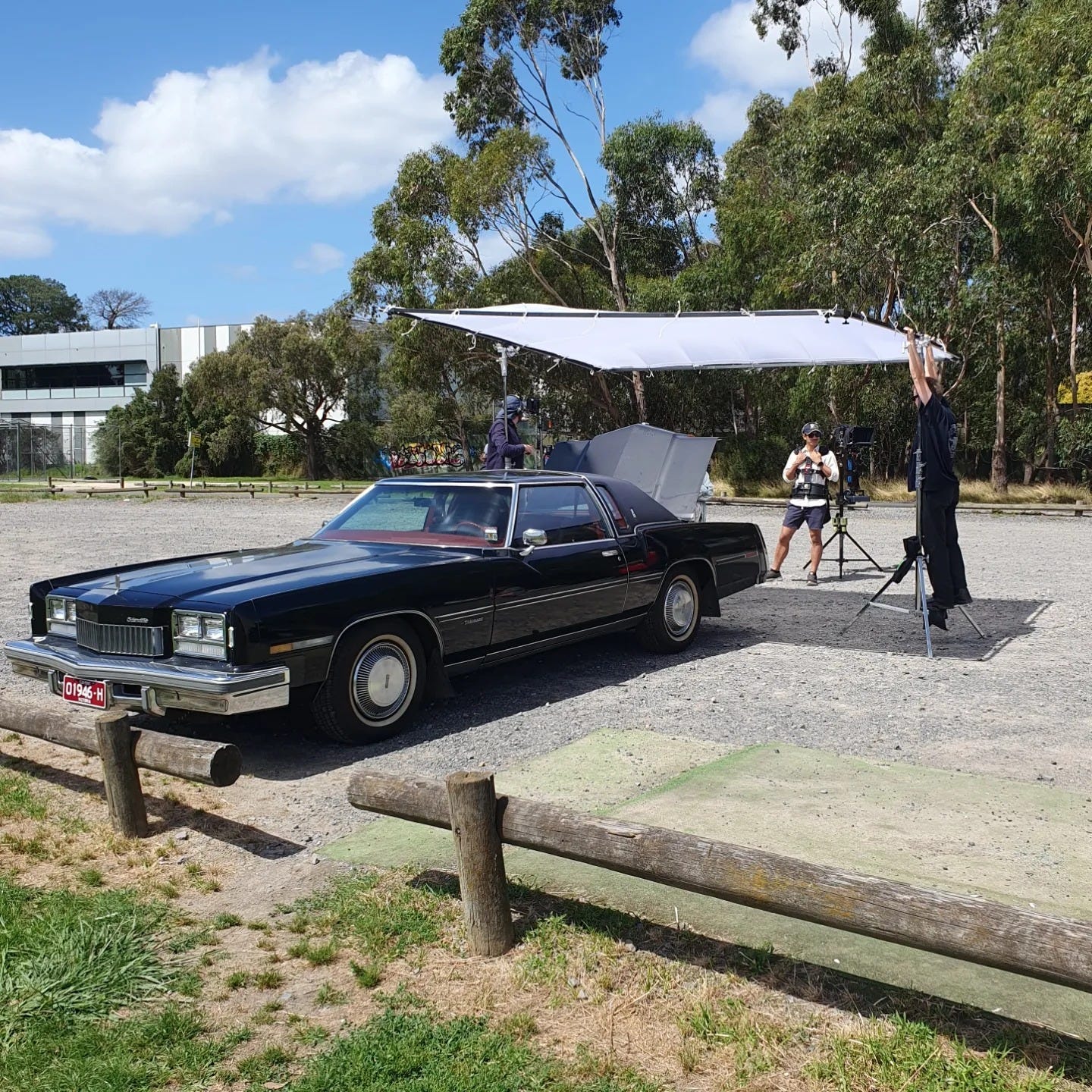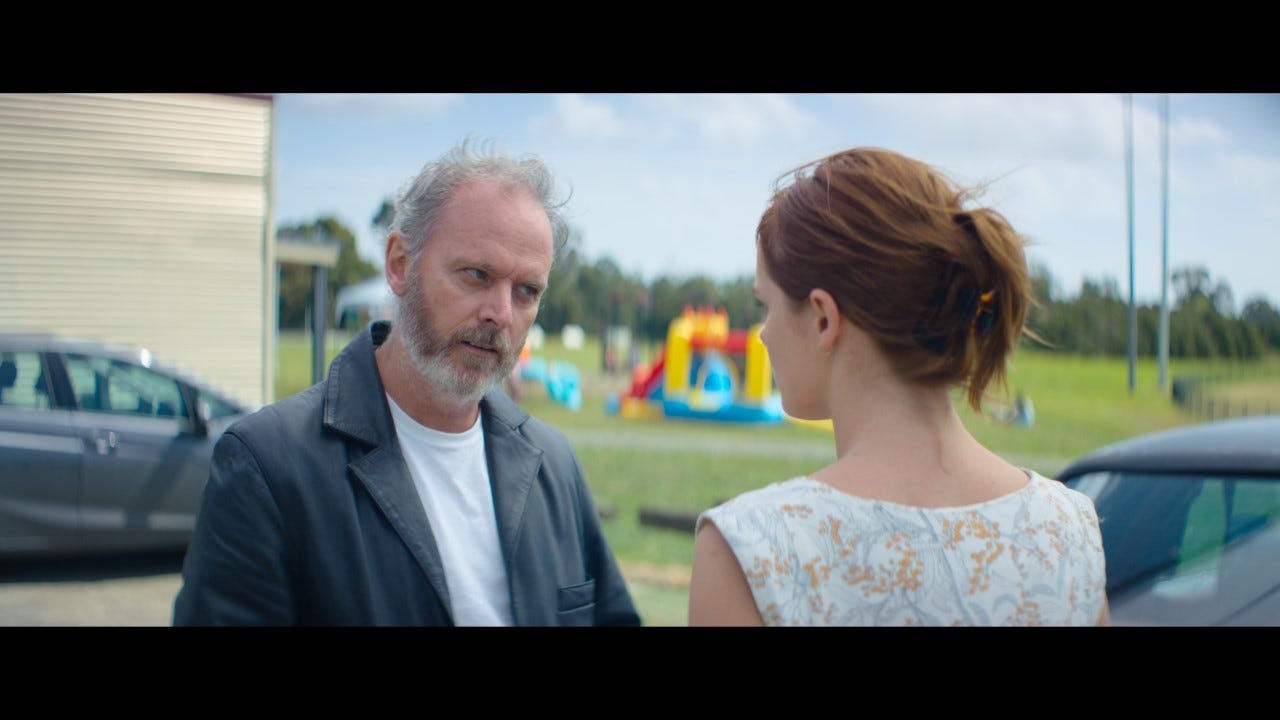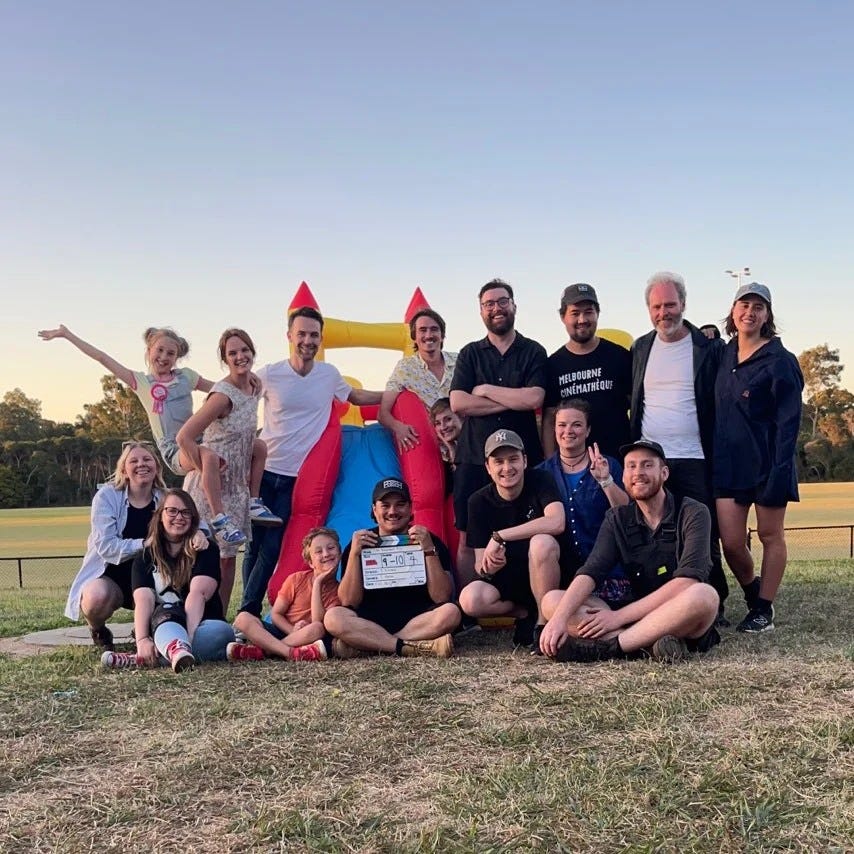We Made A Movie
I’ve always wanted to make a short film but never had the slightest idea of how. In the past I had vague notions of adapting one of my plays or something, but nothing ever really stuck. A big factor there was cost – I remember on a couple of occasions sending draft scripts to friends who worked in the film industry and going pale when I got back their estimated budgets.
See, theatre you can more or less make for free, provided everyone is willing to take a share of the profits rather than upfront payment. Film, not so much, especially not if you want it to be good. So none of those vague ideas ever came to fruition.
But last year, after moving in with the legendary John Erasmus, I decided to try again. I was as keen to write a short as John was to direct one, so the stars looked to be aligning. Initially I pitched him a blurry concept about two undercover cops trying to get rid of a body. John suggested setting that story at a children’s birthday party. And man, didn’t that just unlock it.
Turning ideas over in my head the next morning, the shape of the film almost immediately tumbled into shape, something funny, tense, and shocking. I wrote a script and over the next few months John and I bounced it back and forth, shaping and refining until we were both happy with it. Then we started to think about casting. I’d included the character of Jack Carlin, meaning Gregory Caine was a default to reprise his role from The Consequence and The Pact. For the others, we explored a lot of options but ultimately the lead roles were taken on by actors I’d worked with before in theatre, friends I trusted completely who also happened to be great performers. With the film being independently funded by John and myself, we had to make sure that we had a team who we could rely on, and further to that after years of being involved in my stage work, there was something consistent and comforting about bringing Ayesha Gibson, Kashmir Sinnamon and Troy Larkin on board.
So we started to build towards production. Well I say ‘we’, but it was really all John. Honestly, the hours he poured into pulling together a team, organising permits and scouting locations while working full time as an editor on a major upcoming feature was staggering to me. I’d come home to big production meetings in which I felt as useless as I did daunted – not only was this thing gonna happen, it was happening with a hell of a crew.
I’d written us into some pretty difficult corners – for example, Jack Carlin drives a classic muscle car, which we’d have to try and source, and the children’s birthday party setting meant casting child actors (although I blame John for that idea). But an actress friend of John’s had a daughter who was not only keen to be involved, but hilarious but talented as hell AND it turned out our neighbour’s husband was a car collector who offered up the use of his classic Ford Toronado for free, an act of generosity that still staggers me. So much fell perfectly into place.
By the time filming rolled around everything had gone so smoothly I was sure we were going to face a last minute disaster. But the first shoot day was a dream. Working from the house of filmmaker Glenn Triggs, not only did we get great domestic footage and shots of Greg ominously guiding the Toronado through suburban streets, but Glenn being a qualified drone operator meant we also got some stunning overhead shots that give the film a sense of real scale. I’d been teetering between fear and excitement for much of the leadup to the shoot but the scales were tipping toward the latter, especially when John showed me the assembled footage from the first day. We had something really cool on our hands.
Then day two happened.
Relegating that introduction to its own paragraph probably makes it sound worse than it was, although to be fair it felt pretty terrible at the time. There’s a strange sense of frustrated, useless panic you get when everything spirals out of control and there’s nothing you can do to stop it. Filming in a park in Wantirna, first we were held back by unexpected rain. Then a group of middle aged cyclists who apparently meet once a month to talk about their bikes in the park via a speaker system turned up to do exactly that while proving entirely oblivious to the film shoot happening around them. Being a public place, we had to wait them out. They left. We hurried to get to work. Strong winds blew away half our set. The rain came back. So did the cyclists.
I hated that morning. I mean, being a screenwriter on a film set feels pretty useless anyway, but sitting around with the cast and extras while nobody can do anything and a tightly organised schedule slips further and further out of the realm of credibility was tough. Getting the whole film shot in three days was always going to be a tall order, but to be delayed by several hours felt almost fatal. With such a big crew and such immense challenges securing them even for the days we had, it didn’t seem viable to extend the shoot, especially not when you’re relying on a lot of child extras and temperamental weather.
But finally the cyclists left, the sun came out, and the crew got to work. And in those moments what we were paying for became extremely obvious. These guys absolutely nailed it. We got almost all the footage planned for the day, and none of it looks compromised in the slightest.
But the delays had a ripple effect. We’d got most of the footage but not all of it, and the third and final day of shooting was already looking to be the biggest. John, MVP cinematographer Tim Morton and I had a big talk – could we extend the shoot? Did we have a choice? I’ll admit to being the impatient one wanting to see the film wrapped within the week, but Tim and John pointed out that given the quality of the footage we had, to compromise it via a rushed shoot was a bad idea. I agreed. An extra half day was added to the schedule to get an interior scene that didn’t need extras.
Then Greg, typically in demand, got the call that he’d be returning to Utopia for the upcoming season, and his character did not tend towards Jack Carlin’s shaggy hair and scrubby beard. Meaning Greg would lose them before the scheduled final shoot day.
There was no choice. We had to wrap the film on the third day. It would be a marathon. A 5am start. An 8pm finish. Barely any room for breaks. It would ask a huge amount from the cast and crew. But it had to be done.
Is it anticlimactic to say they did it? Look, it wasn’t easy. Wandering around the set being no use to anyone, even I could see that. But there were no more disasters, no more wild weather or cyclist cults. The final day was clear and warm. Other visitors to the park kept their distance, apart from one man who insisted on using the toilet we were filming in. But compared to the week before, these were tiny issues. There was a lot of footage to get and there was doubt that we could do it. But we did. When, the sun setting, John finally called ‘that’s a wrap!’ the satisfaction and relief from everyone was palpable. Later that night, out for ill advised but completely necessary drinks, John looked totally stunned when he said ‘holy shit we did it’.
The already assembled footage looks fantastic. It will be a while until the film is ready to be seen, then it’s festival entries and hopefully some kind of public premiere. But until then, I’m going to steal his sentiment. Holy shit, we did it.
Project Updates
This past month has been largely dominated by The Retirement Plan, but that doesn’t mean I haven’t had other projects to juggle. I finally delivered the second draft of The Caretaker to HarperCollins after extensive revisions, and have been working through the first round of notes on Andromache Between Worlds. Then of course there’s the ongoing work on The Lodger, which will be my big project for the foreseeable future.
There’s one other new project on my slate as well, one that’s very much a personal labour of love and now looks like it will come to fruition. But I’ll talk more about that in a future newsletter…
Better Call Saul Article
Not long after Better Call Saul wrapped, I wrote an article celebrating the show’s storytelling. As anyone who followed my newsletters last year will know, I love Saul dearly, even more than Breaking Bad, and it’s been an enormous influence on my own work. So I was stoked that Den of Geek published my piece to celebrate the anniversary of Saul’s first episode. Check it out here.
Readers and Writer’s Festival
At the time of this newsletter dropping we’re only a couple of days from the launch of the inaugural Mansfield Reader’s And Writer’s Festival. I’ll be there, appearing on a few panels – if you’ve got tickets, see you soon, if not I believe there are still a few available!
Recommendations
A few years back I, like everyone else, went through a massive Broadchurch phase (first season, anyway). While espousing its virtues, I was told to try Happy Valley, being told it was the ‘better Broadchurch’. I basically ignored this until, a couple of years later, I was doing a workshop for playwrights at Matchbox Films and part of the homework was watching Happy Valley. I chucked on the first episode and finished the first season that night.
Happy Valley is not the ‘better Broadchurch’. It doesn’t even exist on the same quality level as Broadchurch, which had one great season, one truly terrible one, and one that was basically in the middle. Happy Valley starts strong and stays there. It centres on one of the best performances I’ve ever seen, Sarah Lancashire absolutely inhabiting Catherine Cawood, a world-weary Northern English cop forced to confront her family’s terrible past when an old enemy returns to town. I defy anyone to watch the show’s first two minutes and then stop until the breathless series finale.
After seven years the third and final season kicked off at the start of January. Given the high standards of everything that went before, there was maybe a little trepidation but within seconds it was clear that Happy Valley’s sharp-edged power had gone nowhere. Dark, gripping, and very funny, these final six episodes were met with no shortage of online theorising about secret plans and shock twists and who might actually be whose relative. But Happy Valley was never that kind of show. It was all about honest, solid, no-fuss storytelling and that’s exactly what the final episode delivered. There were maybe a few more goodbyes it could have afforded us, but the big showdown was exactly as powerful and satisfying as anyone could have hoped for, and the episode bowed out with a quiet sense of a job well done.
It's no secret that British crime dramas offer some top level stuff. Happy Valley is the top of that level and its final season was no exception.




